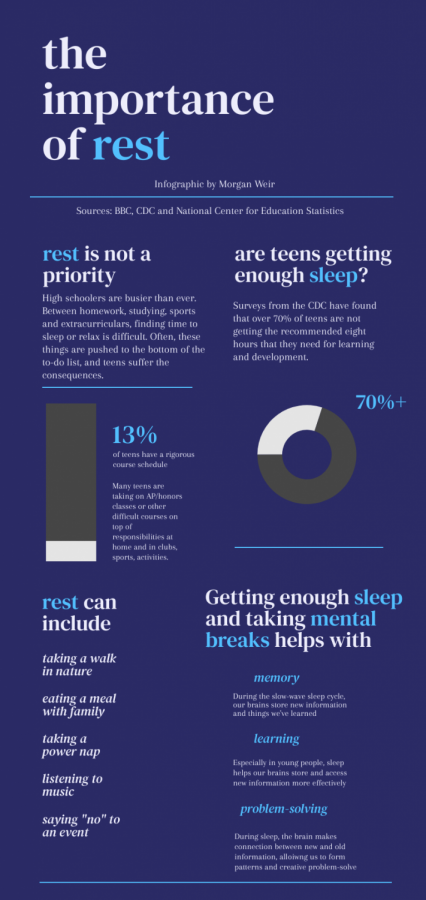Students deserve a break
Hustle culture is damaging to teens
Students are overwhelmed with work and pressured to push even harder each day. Rest, in any form, is often their last priority.
September 14, 2020
As a pandemic swept the globe and forced people into their homes, society had to slow down. Within the first week of stay-at-home orders, grind culture managed to pry its way into the new way of life. Work and school were moved online, and, with newfound free time, we were encouraged to work out more, pick up a new hobby or start a new project. Instead of resting, breathing and slowing down, we found ways to fill the extra space with more work.
This behavior, known as grind culture or hustle culture, is rampant in everyday society. Grind culture equates longer work hours with achievement. It demands constant, unrelenting progress and improvement. It throws family, sleep, mental health, fun and personal well-being to the side. It forces everyone into a narrow box of success that leaves no room for personal dreams or goals. For students, grind culture is particularly crushing.
From the beginning of elementary school, we are taught to work hard and not rest. We are told that grades are directly proportional to how many hours we spend studying and how much energy we give to a class. No matter how hard we push or how much we work to improve, it’s never enough. A 3.5 GPA could be turned into a 4.00, a club or activity could be turned into a leadership role and a position on a sports team could be leveraged into an athletic scholarship.
High school students today are busier than ever. They’re more involved in their schools and communities.They have more intense academics and take more difficult classes. The National Center for Education Statistics found that around 13% of high schoolers today have a rigorous course schedule, compared to 5% in 1990. However, students still have the same amount of time in a day that high schoolers did a few decades ago. The expectations are higher, which means students learn to prioritize. Rarely do we prioritize rest. The Center for Disease Control and Prevention found that over 70% of high schoolers are getting less than the recommended eight hours of sleep.
In our society, rest is a sin. As students, we brag about how we have four hours of homework each night, how we have extracurriculars every day of the week or how few hours of sleep we got last night. A 2015 study from The University of Texas suggests that mental breaks and rest can help students process and store new information when they are learning. As reported by the BBC, studies have also shown that, during certain stages of sleep, our brains connect new information with previous knowledge and improve our ability to access the most important pieces of that information. Rest is not a sign of failure or laziness; it is a critical step in helping students learn and retain knowledge more effectively.
Resting, however, can mean more than just getting enough sleep. It requires flexibility, balance and slowing down in daily life. Even during their free time, many students are still stressing over homework, tests, grades and extracurriculars. True rest requires us to allow ourselves a complete mental break from work or school. It’s about balancing responsibility with enjoyment. It’s about reprioritizing our own well-being above achievement or improvement. Most of all, it’s about taking an intentional step away from the fast-paced grind of daily life. This can look like enjoying a meal with family instead of trying to cram an extra 20 minutes of studying in, taking a walk in nature without thinking about a looming due date or taking five minutes to meditate instead of rushing to finish homework in the morning.
Beyond exhaustion, hustle culture breeds competitiveness. Students should be collaborating with each other and building a sense of collective compassion, but instead they are taught to compete over who got the highest test grade or who is taking the most AP classes. Despite the fact that many schools, including Millard West, have done away with class rank, there is an unspoken pecking order when it comes to academics and involvement in clubs or sports.
This constant pressure forces students to push themselves to exhaustion in order to perform better, but performance often destroys the joy of learning and the ability to make genuine progress. Students are left playing a game to get better grades and to have a longer transcript in order to beat out their peers. In this game, it doesn’t matter if they actually understand how to apply math concepts as long as they can score enough points on a math test. It makes no difference whether or not their writing skills improve if they can manage to get an A in English class.
The irony of grind culture is that it convinces people to work as much as possible and push themselves as far as they can without actually giving them room to question where they even want to be going. For students who are too overworked and under rested to think about anything other than academics, it’s hard to reflect on what we really want for ourselves and our future. We hustle for four years to get into the best college we can, get a high-paying career and find lifelong success but we aren’t always encouraged to ask ourselves what success looks like for us.
As students, we are at our best when we are rested and restored. We only find true success when we are the ones defining what success is. We only make meaningful improvement when we are the ones asking ourselves what we need and where we want to get to. Playing into this toxic culture of constant hustling will only push us further in a direction we may not want to go until we end up burnt out and tired, unable to change course.
Grind culture is the continuous voice in our head that tells us we need to be doing more, working harder, pushing farther. As students, in order to find true success, we need to shut that voice down and listen to our own needs, our own desires and our own voice.







